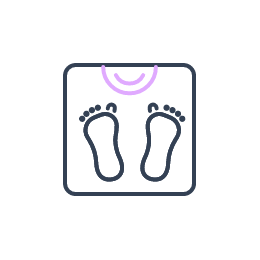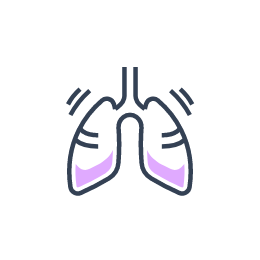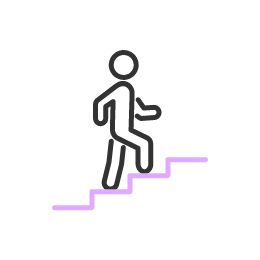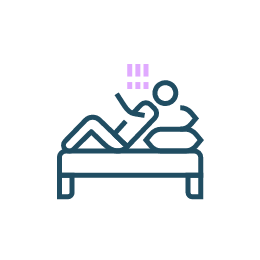How well do you understand heart failure?
It’s common for people who have been diagnosed with the condition to still feel unsure of what heart failure is and what it could mean.
Heart failure is a condition where your heart can’t pump blood around your body as well as it should. It
doesn’t mean your heart has stopped working but you may need support to help it work better.1
It can occur at any age but is most common in older people. It is a long-term condition that tends to gradually get worse over time and while it cannot usually be cured, the symptoms can often be controlled for many years.2
Symptoms of heart failure and progression
When your heart isn’t pumping as well as it should, you might notice some of these symptoms.3

Weight Gain

Breathlessness (e.g. While walking)

Tiredness

Swollen legs and ankles

Difficulty with day-to-day activities

Breathless while lying down

Continuous cough

Bloated stomach
Please note this is not an exhaustive list of symptoms
For many people the symptoms of heart failure develop slowly over time. It’s really important to understand and monitor your symptoms, so that if you feel different or worse, you can speak to your healthcare professional for advice.
For a select list of symptoms please refer to NHS heart failure symptoms at: https://www.nhs.uk/conditions/heart-failure/symptoms/ for further information.
Ask your family, carer or a friend to help you monitor your symptoms.
YOURCHOICE
ENGAGE

Supporting you at every stage of your treatment journey
The Entresto® YOURCHOICE ENGAGE programme provides patients like you with valuable support on your treatment journey. Through regular emails we can support you in learning more about your Entresto® treatment, understand how to manage any possible side effects and even help you to find further helpful information and resources.
YOURCHOICE ENGAGE can also help you to:
-
Find reliable and up-to-date information relevant to you
-
Read and hear stories from other patients
-
Learn tips to help you stay on track with your treatment
-
Discover information and sources of emotional and well-being support
Do not stop taking your medicine unless your healthcare professional tells you to
Stopping your treatment with Entresto may cause your condition to get worse. If you have any further questions on the use of this medicine, ask your doctor or pharmacist4
The New York Heart Association (NYHA) Functional Classification
Doctors usually classify patients’ heart failure according to the severity of their symptoms. This table describes the most commonly used classification system, the New York Heart Association (NYHA) Functional Classification. It places patients in one of four categories based on how much they are limited during physical activity.5
| Class | Patient symptoms |
|---|---|
| Class 1 (Mild) | No limitation of physical activity. Ordinary physical activity does not cause undue fatigue, palpitation, dyspnoea (shortness of breath). |
| Class 2 (Mild) | Slight limitation of physical activity. Comfortable at rest. Ordinary physical activity results in fatigue, palpitation, dyspnoea (shortness of breath). |
| Class 3 (Moderate) | Marked limitation of physical activity. Comfortable at rest. Less than ordinary activity causes fatigue, palpitation, or dyspnoea. |
| Class 4 (Severe) | Unable to carry on any physical activity without discomfort. Symptoms of heart failure at rest. If any physical activity is undertaken, discomfort increases. |

What causes heart failure?
Heart failure often occurs when a number of separate problems have been affecting the heart.
This can include:
- Coronary heart disease
- High blood pressure
- Cardiomyopathy
- Heart rhythm problems
- Damage or other problems with the heart valves
- Congenital heart disease
Sometimes anaemia, obesity, drinking too much alcohol, an overactive thyroid or high pressure in the lungs (pulmonary hypertension) can also lead to heart failure.2
Making the most of your time with your healthcare professional
Throughout the course of your treatment your healthcare team is your best resource for any information or advice. Speaking openly with them about your feelings or any questions you have can be a tremendous help.
Your specialist heart failure team (also known as a multidisciplinary team, or MDT) can work with your primary care team (e.g., your GP) and can include:
- A doctor with training in heart failure (usually a consultant cardiologist)
- A heart failure specialist nurse
- A healthcare professional with expertise in dispensing medication for heart failure (e.g. a Pharmacist)

References
- British Heart Foundation. Heart Failure. Available online at: https://www.bhf.org.uk/informationsupport/conditions/heart-failure#:~:text=Heart%20failure%20is%20a%20condition,%EF%BB%BF [Last accessed: July 2024]
- NHS. Heart Failure Overview. Available online at: https://www.nhs.uk/conditions/heart-failure/ [Last accessed: July 2024]
- NHS. Heart failure - Symptoms. Available at: https://www.nhs.uk/conditions/heart-failure/symptoms/ [Last accessed: July 2024]
- EMC. Entresto patient information leaflet. Available from: https://www.medicines.org.uk/emc/files/pil.7751.pdf [Last accessed: July 2024]
- Heart.org. Classes of Heart Failure. Available online at: https://www.heart.org/en/health-topics/heart-failure/what-is-heart-failure/classes-of-heart-failure [Last accessed: July 2024]
UK | July 2024 | 172743-3